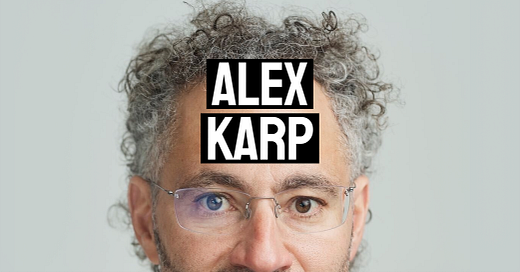The Rise of Silicon Valley's Tech-Faith Movement: Why Palantir's Pray.com Deal is More Important Than You Think
From Government Spyware to Scripture: An Insider's Look at Tech's Top Performing Public Company
Living in San Francisco's tech scene, I've witnessed many transformations. But none is quite as fascinating as the intersection of faith, technology, and venture capital that's unfolding before us. Today's Palantir earnings call brought this into sharp focus, and there's a bigger story here that most are missing.
The Unexpected Faith-Tech Revolution
When I first encountered Palantir in Georgetown's tech corridor back in 2015, it was known primarily as a government contractor with deep intelligence ties. Fast forward to 2025, and we're seeing something remarkable: the emergence of a tech-faith movement led by some of Silicon Valley's most influential figures.
At the heart of this transformation is an unlikely duo: Trae Stephens and Peter Thiel. While most know Thiel as Palantir's co-founder and tech visionary, fewer are aware of the growing spiritual dimension of his influence. Through Founders Fund, they've been quietly building a bridge between Silicon Valley's technological ambitions and faith-based communities.
The Pray.com Partnership: More Than Just Another Deal
The recent Pray.com partnership isn't just another commercial deal – it's a testament to this larger transformation. Here's why it matters:
Market Evolution: Pray.com isn't just another meditation app; it's becoming the "Calm.com of scripture" in a rapidly growing faith-tech market. The partnership reduces content translation time from days to minutes, demonstrating Palantir's ability to solve real-world problems at a scale beyond the government contracts they are most known for.
Cultural Shift: As Trae Stephens recently shared with 300 tech leaders at Epic Church San Francisco, the question isn't just about technology anymore – it's about "participation in humanity's redemption." This represents a fundamental shift in how Silicon Valley thinks about purpose and profit.
Strategic Alignment: When Alex Karp says, "So many of the people protecting us look to their faith," he's not just making a PR statement. He's acknowledging a deep connection between Palantir's traditional government work and its emerging commercial mission. This played out in real time with the landslide presidential election we just witnessed.
The Pray.com Partnership: A Strategic Masterpiece
Ryan Beck, Pray.com's Founder and CTO, puts it perfectly: "I was impressed by Palantir's reputation and their years of pioneering AI applications. We wanted to move our tech stack from a pre-AI stack to a post-AI stack, and Palantir moved us into a post-AI world."
The Numbers Tell a Story
Palantir's Q4 results reflect this transformation:
36% year-over-year growth
52% growth in US revenue
An impressive 81% Rule of 40
$5.2B cash position with zero debt
But these numbers only tell part of the story. The real narrative is about how Palantir is positioning itself at the intersection of three powerful forces: AI technology, faith communities, and enterprise software.
Looking Ahead: The Bigger Picture
What makes this particularly fascinating is how it mirrors larger changes in Silicon Valley. We're seeing a new generation of leaders like Stephens, who aren't afraid to bring their faith into their technical and business pursuits. As a Christian, myself it has been amazing to see the increase in faith in a city like San Francisco. At Epic Church San Francisco, he asked whether our tech pursuits are "awakening a Balrog" or contributing to humanity's redemption – a question that would have seemed out of place in Silicon Valley just a few years ago.
The Pray.com partnership shows how this philosophical shift is translating into practical business opportunities. By helping faith-based organizations leverage AI for content translation and distribution, Palantir is demonstrating how deep tech can spiritual needs while building a sustainable business model. Pray.com alone has raised over $34 million and competes with a slew of other companies that have raised billions of dollars to help us pray more, meditate, and read scriptures.
Why This Matters for Investors and Entrepreneurs
For those watching the tech sector, this evolution offers important lessons:
The next wave of growth might come from unexpected intersections of technology and traditional institutions
Value alignment between technology providers and their users is becoming increasingly important
The ability to serve both government and commercial markets could be a crucial differentiator
I believe that number three will matter so much more, as we see with DOGE, the goal o,f downsizing the government is in a full sprint for the next 18 months. How can we do both, downsize the government, and provide a better service? I think technology is going to be a major part of that — companies like Palantir will continue to push into their core business but I also see that technology being deployed into other industries.
A Personal Note
As someone who's been investing in Palantir (albeit more recently than some), I've watched this transformation with growing fascination. The recent gathering of 300 tech leaders at Epic Church San Francisco isn't just another tech meetup – it's a signal of a broader cultural shift.
Looking Forward
For those interested in following this story further, I recommend keeping an eye on:
Arny Trezzi (Palantir Bullets): His insights on Palantir inspired this post and he has 8,000 subscribers on his Substack.
Steve Gatena (Pray.com CEO): His vision of "protecting and defending religious liberty on a global scale" through technology.
Ben Pilgreen: Pastor of San Francisco’s Epic Church.






Can AI actually make faith more accessible, or will it just turn spirituality into another business? And if tech giants are leading this, who’s really shaping the future of religion?